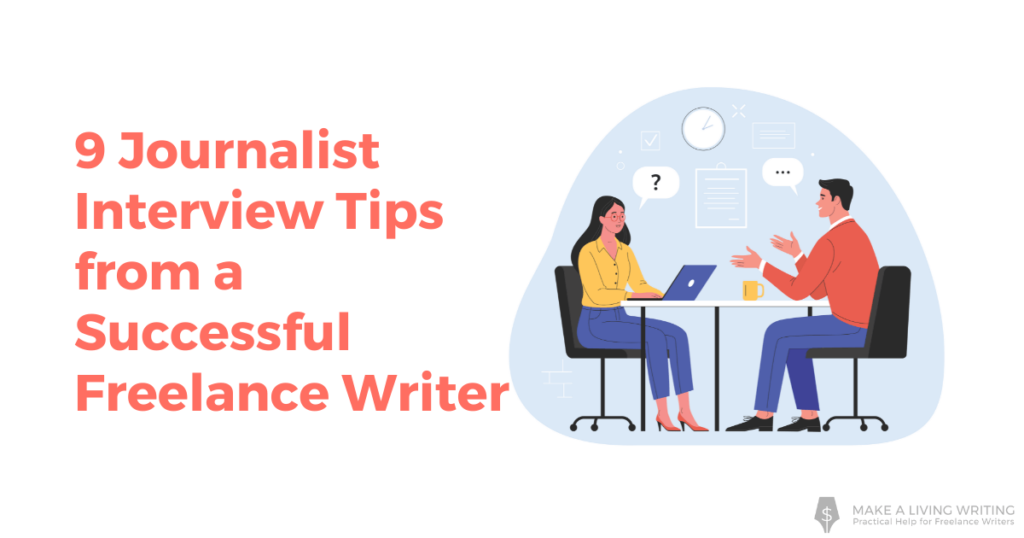Have you been struggling to interview sources for your freelance articles? Then these 9 interview tips are for you.
These journalist interview tips will help boost your interviewing confidence and make you better prepared to take your freelance article to the next level!
I compiled these because I have found that many freelance writers are struggling to differentiate themselves in the freelance writing world right now. The problem is many do not have the journalism background that helps you step into higher-level content that relies on interviewing original sources.
Because after all, more companies want to create and publish original content that can not be easily duplicated.
But how do writers grapple with all the fine points of finding interview sources and then get them to not just talk, but say something fascinating?
For a freelance writer, the difference between getting lukewarm quotes and sparkling, informative quotes could be the difference between securing $100 articles and $2,000 articles.
But what are the interview secrets you need if you don’t have a journalism background?
I’ve shared some interview tips before, but I’ve learned there are some fine points of interviewing that new writers often don’t know. Here’s what I’ve learned doing hundreds of interviews over the course of 12 years of staff-writing jobs:
Don’t treat an interview the same as an email
Emails are emails, and interviews involve speaking to people either on the phone, through a video call, or in person.
The idea that emails are equivalent to interviews seems to be spreading like a virus lately, as writers come into the field from routes that don’t pass through journalism school or a newspaper staff job.
But you shouldn’t email sources your questions and then use their email responses as your quotes unless you absolutely must — it isn’t good practice unless the source is expecting that outcome.
If you do quote from an email, you must cite it appropriately, as in: “Thank you for reaching out,” said Joe Shmoe in an email response. Better-paying markets will expect real interviews and might be upset if they discover you’ve tried to pass off email transcribing as interviewing.
In any case, you want to talk to people live – you’ll have a chance to ask more follow-up questions and tease out the really good stuff.
Start by establishing rapport with your source
In the first weeks of my first staff-writing job, I went on a road trip with my editor to Vancouver, B.C. Our publication covered home improvement retail, and we went to visit the owner of a large lumberyard chain at his company headquarters.
My New York-based editor conducted the interview, and I was astonished to find that he didn’t really ask him much! We had traveled all this way, and they basically just shot the breeze for a half-hour. Afterward, I asked him why he hadn’t tried to learn more about the man’s business or asked him any tough questions.
“Oh, I just came here to build my relationship with him,” my editor replied. “Now, any time I need to know something such as what’s going on in this market, I can always call and ask him, because I took the time to come out here and meet him in person, and get to know him.”
Don’t be the sort of reporter who vacuums facts from a sources’ head and then leaves them a spent husk, never to return again. \
Instead, build a relationship and cultivate sources you can use again. See if you can find a personal level on which to connect – a hobby, your kids, where you went to college. The more relationships you build with sources, the easier your work gets over time.
And you never know when you’ll be writing on a similar topic again.
Remember your source is probably just as nervous as you are
Often, new writers tell me they’re petrified about picking up the phone and making that interview call. Later, they often report back that the source seemed as nervous as they were!
Remember that interview subjects may be worried about how they’ll appear in print and nervous they will say the wrong thing and misrepresent their company.
So before you pick up the phone, take a big breath and relax. Your calm manner will help your source relax, too.
Be over-prepared
There is nothing that screams lack of preparation like this introduction when interviewing a source, “So, tell me about your business! What do you do exactly? I haven’t had a chance to look at your website yet.”
Really? There’s just no excuse for that.
Before you approach your source, take the time to learn about your source and your topic, and come prepared to ask some informed questions. Page through their website, take a look at their LinkedIn, make note of anything notable that stands out. (Also, make sure your Linkedin is in good shape.)
That way you won’t waste sources’ time, and you might be able to work with them again.
Be brief with your questioning
One of the most useful interview secrets I like to share is, the amount of time you spend with a source should be proportional to how much space they will get in your story.
Unless you’re writing a 3,000-word feature profile of someone, you shouldn’t take more than a half-hour or 45 minutes, in my view. If you just need a few quick quotes from someone, take 15 minutes and be done with it.
I used to know a reporter who’d do every interview in person and spend multiple hours with each subject. Many would later call the paper to complain about how he had wasted their time, after seeing that large time investment translated into one quote in the story!
Be respectful of people’s time and don’t give them unrealistic expectations of how much you’ll quote them.
Have your questions prepared ahead of time
You should have a goal in mind before you start your interview. What is the end result you are hoping to achieve? From that goal craft questions that will help your source get there.
Most sources will need a little prompting to give you the information you need. Make sure your questions are open-ended and include additional possible questions to help sources expand on their answers.
Remember an open-ended question requires an explanation, and cannot be answered by a simple yes or no. Ask questions that encourage reflection and explanation rather than shut down the conversation.

Use the interview to get more story ideas
The end of an interview is a great time to learn more about your topic and find additional ideas for future stories.
End your conversation with one or two questions like these: “What else is going on in your industry right now? Who are the interesting new thought leaders? What will happen next year? What was the big topic of discussion at the last conference you attended?”
Forget your question list at the end, and find out what’s on their mind. You’ll often leave with your next query letter ready to write.
Use technology for help
If you are just planning for a short interview for just a quote or two, then a phone call will most likely be your best option. But if you are planning to talk for 30 minutes or longer with your source then it is a good idea to schedule a video call using either Zoom, Google Meet, or another service.
Whatever tool you are comfortable using, make sure to clearly specify what type of interview you are looking to schedule. Set the proper expectations ahead of time, either by asking for the best phone number to call them and then sending a calendar invite, or else create the video conferencing link ahead of time and include that in your calendar invite.
Make it clear what type of call and how much time you are asking for.
If you are planning on having a video call that will be 30 minutes or longer, you might want to record the call to help with your note-taking. Before you begin, make sure to ask if you can record the call if you think recording the conversation would be helpful. If you have never recorded a video call before, do a trial run with a friend before you record in a professional setting.
Expect to follow up
Some writers I’ve mentored are terrified they’ll forget to ask something, and then have to endure the mortal embarrassment of calling the source back again. They worry they’ll never be able to get another response.
But unless you’re interviewing a reclusive billionaire who’s giving his only interview in decades or some such, this fear is really unfounded. No source is going to yell at you for asking a follow-up question. In fact, callbacks are routine.
Often, your editor might ask for a new fact that would require a callback, anyway.
My normal final comment to sources is, “What is the best way to reach you if I have any additional questions when I’m writing this up?”
Need more help?
Check out these resources with more interview secrets for you to get more help conducting interviews for your clients.
How to Write a Profile: 8 Tips for a Compelling Piece











